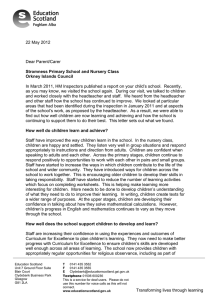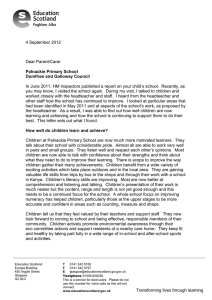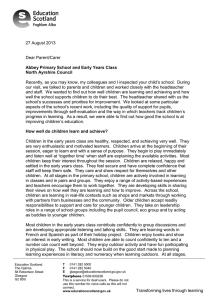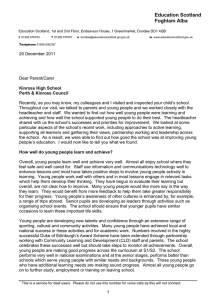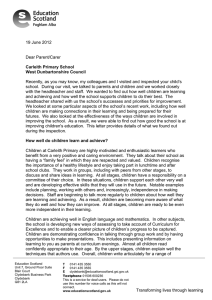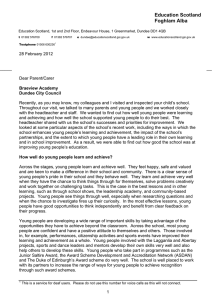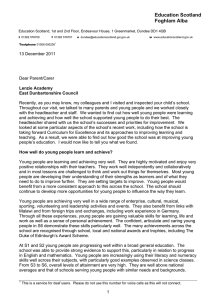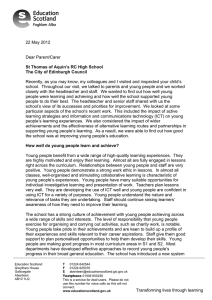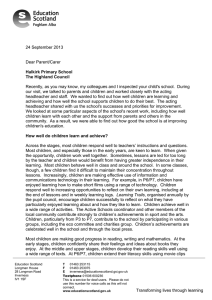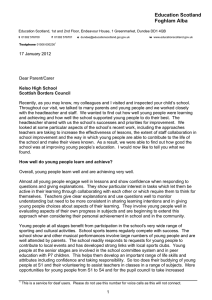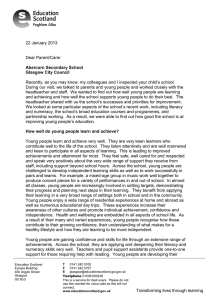Education Scotland Foghlam Alba
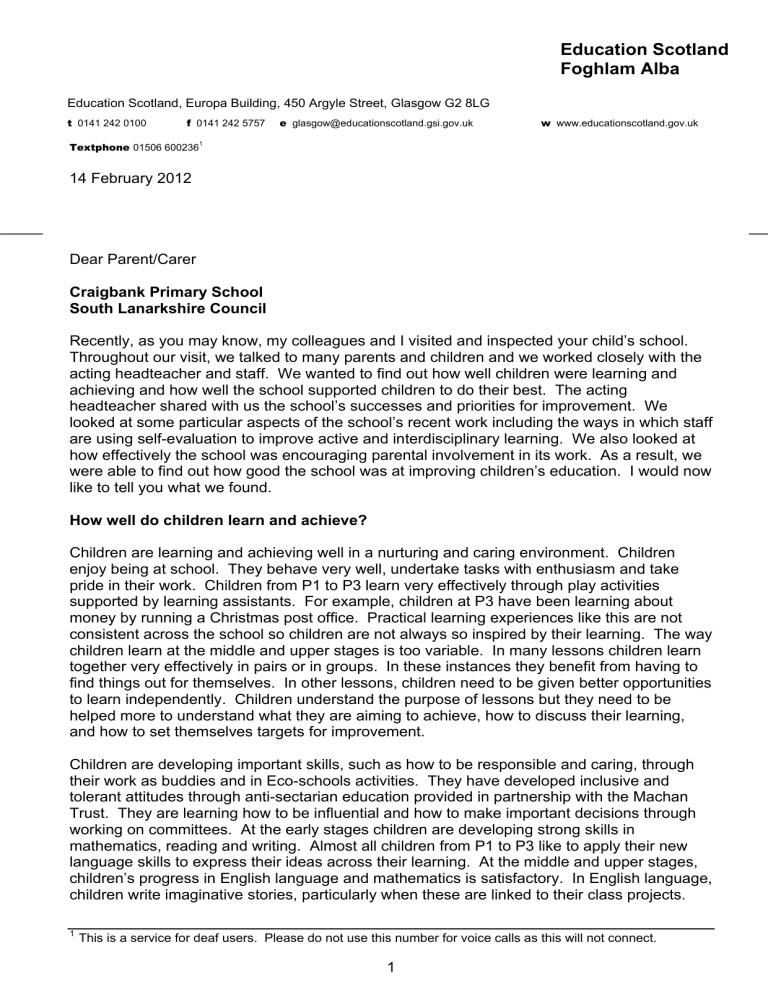
_____
Education Scotland, Europa Building, 450 Argyle Street, Glasgow G2 8LG t
0141 242 0100 f
0141 242 5757 e
glasgow@educationscotland.gsi.gov.uk
Textphone
01506 600236
1
14 February 2012
Education Scotland
Foghlam Alba
w
www.educationscotland.gov.uk
Dear Parent/Carer
Craigbank Primary School
South Lanarkshire Council
Recently, as you may know, my colleagues and I visited and inspected your child’s school.
Throughout our visit, we talked to many parents and children and we worked closely with the acting headteacher and staff. We wanted to find out how well children were learning and achieving and how well the school supported children to do their best. The acting headteacher shared with us the school’s successes and priorities for improvement. We looked at some particular aspects of the school’s recent work including the ways in which staff are using self-evaluation to improve active and interdisciplinary learning. We also looked at how effectively the school was encouraging parental involvement in its work. As a result, we were able to find out how good the school was at improving children’s education. I would now like to tell you what we found.
How well do children learn and achieve?
Children are learning and achieving well in a nurturing and caring environment. Children enjoy being at school. They behave very well, undertake tasks with enthusiasm and take pride in their work. Children from P1 to P3 learn very effectively through play activities supported by learning assistants. For example, children at P3 have been learning about money by running a Christmas post office. Practical learning experiences like this are not consistent across the school so children are not always so inspired by their learning. The way children learn at the middle and upper stages is too variable. In many lessons children learn together very effectively in pairs or in groups. In these instances they benefit from having to find things out for themselves. In other lessons, children need to be given better opportunities to learn independently. Children understand the purpose of lessons but they need to be helped more to understand what they are aiming to achieve, how to discuss their learning, and how to set themselves targets for improvement.
Children are developing important skills, such as how to be responsible and caring, through their work as buddies and in Eco-schools activities. They have developed inclusive and tolerant attitudes through anti-sectarian education provided in partnership with the Machan
Trust. They are learning how to be influential and how to make important decisions through working on committees. At the early stages children are developing strong skills in mathematics, reading and writing. Almost all children from P1 to P3 like to apply their new language skills to express their ideas across their learning. At the middle and upper stages, children’s progress in English language and mathematics is satisfactory. In English language, children write imaginative stories, particularly when these are linked to their class projects.
1
This is a service for deaf users. Please do not use this number for voice calls as this will not connect.
1
___
Most are using ambitious vocabulary and many have developed good techniques to improve the flow of their stories. By P7, children’s reading skills are below expected levels. Their lack of experience of reading is limiting how well they can identify and use a range of techniques to improve their own writing. In mathematics children carry out written calculations quickly and accurately. Overall, standards of literacy and numeracy need to be improved further.
Notable strengths in children’s achievement in other areas of the curriculum include children’s skills in using a range of media in art, and children’s understanding about a range of world religions.
How well does the school support children to develop and learn?
Staff support children to achieve success in their learning, and now need to give them more challenging learning opportunities. Children in P1 and P2 are very well supported in daily group activities by many parent helpers. This helps parents to understand and support their children’s learning. It also allows class teachers to work closely with small groups of children on appropriate tasks. From P4 to P7 the pace of learning is too slow. Staff need to assess children’s progress better so that they can plan learning opportunities which more consistently challenge all children. Across the school, most teachers provide activities which help children who are experiencing difficulties. Teachers are skilled at supporting those who have social or behaviour difficulties. Staff work closely with other agencies to support children and their families. Children from the Gypsy and Traveller communities are fully included and the school helps them to keep up with school work when they are travelling.
Staff have begun to implement Curriculum for Excellence by planning lessons which engage children’s interest and make learning relevant to their lives. This is particularly effective at the early stages where children build well on their pre-school learning and establish strong basic skills. The school builds children’s skills in a broad range of curriculum areas. Teachers have begun to link projects and lessons to children’s own experiences to help children see the relevance of their learning. For example, financial education develops children’s skills in managing money. They are also learning valuable lessons about health and working with others in the community through gardening projects such as growing oats to make oatcakes.
Some social studies topics still need to be improved to give children the skills they will need for their future lives and work. In particular, staff need to give children better opportunities to practise and apply their literacy and numeracy skills across the curriculum.
How well does the school improve the quality of its work?
The school has been improving children’s learning experiences but has not yet been successful in raising children’s attainment sufficiently. In her short time in post, the acting headteacher has made a strong start to improving the school by working closely with teachers and children. She has introduced a number of effective systems to monitor children’s learning and has developed a clear plan which is focused on raising standards. Encouragingly, staff have improved children’s behaviour so that they can learn more effectively. Staff have also looked closely at children’s progress and started to identify those who need support. They are introducing meaningful links between different subjects in the curriculum and have taken recent steps which are improving children’s writing skills. Staff have responded to parents’ views about their involvement and have made a very strong start to engaging them more in the life and work of the school. Staff need to improve teaching and learning by working with each other in class to evaluate the quality of learning as it is taking place. The acting headteacher will require ongoing support from the local authority to help her to continue to improve the school.
2
This inspection of your school found the following key strengths.
•
The welcoming, caring climate based on good relationships and improved behaviour.
•
Innovative arrangements for involving parents of younger children in their learning.
•
Partnerships within the local community which support learning.
•
The quality of children’s learning at the early stages.
We discussed with staff and the education authority how they might continue to improve the school. This is what we agreed with them.
•
Improve the curriculum taking full account of the experiences and outcomes in Curriculum for Excellence.
•
Develop the use of assessment to plan challenging tasks for all children.
•
Build on the good practice in the early stages so that children at all stages can learn through challenging practical activities.
•
Track children’s progress and help them to take a more active role in improving their own learning.
•
Increase the impact of self-evaluation on improving learning and achievement, involving all children, their parents, staff and other partners.
What happens at the end of the inspection?
We are satisfied with the overall quality of provision. We are confident that most of the school’s self-evaluation processes are leading to improvements. With support from the local authority the school will be able to make the necessary improvements. Our District Inspector along with the local authority will discuss the most appropriate support in order to build capacity for improvement and will maintain contact to monitor progress. Parents will be informed of the extent to which the school has improved.
Jacqueline Sinclair
HM Inspector
Additional inspection evidence, such as details of the quality indicator evaluations, for your school can be found on the Education Scotland website at http://www.hmie.gov.uk/ViewEstablishment.aspx?id=8372&type=2.
Please contact us if you want to know how to get the letter in a different format, for example, in a translation. You can contact us at enquiries@educationscotland.gsi.gov.uk
or write to us at BMCT, Education Scotland, Denholm House, Almondvale Business Park, Almondvale
Way, Livingston EH54 6GA.
If you want to give us feedback or make a complaint about our work, please contact 01506
600200, or write to us at the above address or e-mail: feedback@educationscotland.gsi.gov.uk
.
3
